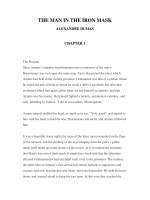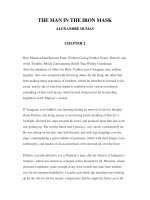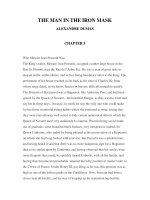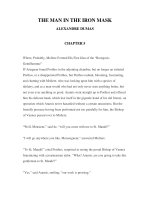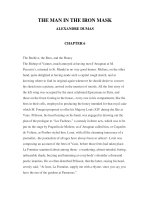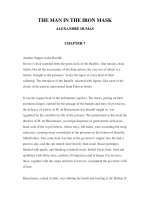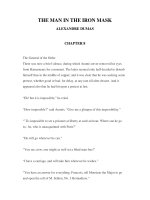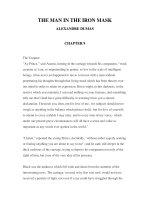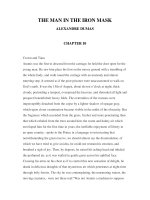THE MAN IN THE IRON MASK ALEXANDRE DUMAS CHAPTER 50 potx
Bạn đang xem bản rút gọn của tài liệu. Xem và tải ngay bản đầy đủ của tài liệu tại đây (25.46 KB, 8 trang )
THE MAN IN THE IRON MASK
ALEXANDRE DUMAS
CHAPTER 50
The Death of a Titan
At the moment when Porthos, more accustomed to the darkness than all these
men coming from open daylight, was looking round him to see if in this night
Aramis were not making him some signal, he felt his arm gently touched, and a
voice low as a breath murmured in his ear, “Come.”
“Oh!” said Porthos.
“Hush! hush!” said Aramis, still more softly.
And amid the noise of the third brigade, which continued to advance, amid the
imprecations of the guards left alive, of the dying breathing their last sigh,
Aramis and Porthos glided imperceptibly along the granite walls of the cavern.
Aramis led Porthos into the last compartment but one, and showed him in a
hollow of the rocky wall a barrel of powder weighing from seventy to eighty
pounds, to which he had just attached a match. “My friend,” said he to Porthos,
“you will take this barrel, the match of which I am going to set fire to, and
throw it amid our enemies; can you do so?”
“Parbleu!” replied Porthos; and he lifted the barrel with one hand. “Light it!”
“Stop,” said Aramis, “till they are all massed together, and then, my Jupiter,
hurl your thunderbolt among them.”
“Light it,” repeated Porthos.
“On my part,” continued Aramis, “I will join our Bretons, help them to get the
canoe to the sea, and will wait for you on the shore. Throw your barrel strongly,
and hasten to us.”
“Light it,” said Porthos, a third time.
“But do you understand me?”
“Parbleu!” said Porthos, with laughter that he did not even attempt to restrain;
“when a thing is explained to me, I understand it. Go, and give me the light.”
Aramis gave the burning match to Porthos, who held out his arm to him to
press, his hands being engaged. Aramis pressed the arm of Porthos with both his
hands, and fell back to the outlet of the cavern, where the three rowers awaited
him.
Porthos, left alone, applied the spark bravely to the match. The spark- a feeble
spark, first principle of a conflagration- shone in the darkness like a firefly, then
was deadened against the match which it inflamed. Porthos enlivened the flame
with his breath. The smoke was a little dispersed, and by the light of the
sparkling match objects might for two seconds be distinguished. It was a short
but a splendid spectacle,- that of this giant, pale, bloody, his countenance
lighted by the fire of the match burning in surrounding darkness! The soldiers
saw him; they saw the barrel he held in his hand; they at once understood what
was going to happen. Then these men, already filled with fright at the sight of
what had been accomplished, filled with terror at thinking of what was going to
be accomplished, uttered together one shriek of agony. Some endeavored to fly,
but they encountered the third brigade, which barred their passage; others
mechanically took aim and attempted to fire their discharged muskets; others
fell upon their knees. Two or three officers cried out to Porthos to promise him
his liberty if he would spare their lives. The lieutenant of the third brigade
commanded his men to fire; but the guards had before them their terrified
companions, who served as a living rampart for Porthos.
We have said that the light produced by the spark and the match did not last
more than two seconds; but during these two seconds this is what it illumined:
in the first place, the giant, enlarged in the darkness; then, at ten paces from
him, a heap of bleeding bodies, crushed, mutilated, in the midst of which was
still visible some last struggle of agony which lifted the mass as a last breath
raises the sides of a shapeless monster expiring in the night. Every breath of
Porthos, while enlivening the match, sent towards this heap of bodies a
sulphurous hue mingled with streaks of purple. In addition to this principal
group, scattered about the grotto as the chance of death or the surprise of the
blow had stretched them, some isolated bodies seemed to threaten by their
gaping wounds. Above the ground, soaked by pools of blood, rose, heavy and
sparkling, the short, thick pillars of the cavern, of which the strongly marked
shades threw out the luminous particles. And all this was seen by the tremulous
light of a match attached to a barrel of powder,- that is to say, a torch which,
while throwing a light upon the dead past, showed the death to come.
As I have said, this spectacle did not last above two seconds. During this short
space of time, an officer of the third brigade got together eight men armed with
muskets, and, through an opening, ordered them to fire upon Porthos. But they
who received the order to fire trembled so that three guards fell by the
discharge, and the five other balls went hissing to splinter the vault, plough the
ground, or indent the sides of the cavern.
A burst of laughter replied to this volley; then the arm of the giant swung round;
then was seen to pass through the air, like a falling star, the train of fire. The
barrel, hurled a distance of thirty feet, cleared the barricade of the dead bodies
and fell amid a group of shrieking soldiers, who threw themselves on their
faces. The officer had followed the brilliant train in the air; he endeavored to
precipitate himself upon the barrel and tear out the match before it reached the
powder it contained. Useless devotion! The air had made the flame attached to
the conductor more active; the match, which at rest might have burned five
minutes, was consumed in thirty seconds, and the infernal work exploded.
Furious vortices, hissings of sulphur and nitre, devouring ravages of the fire, the
terrible thunder of the explosion,- this is what the second which followed the
two seconds we have described disclosed in that cavern, equal in horrors to a
cavern of demons. The rocks split like planks of deal under the axe. A jet of fire,
smoke, and debris sprang up from the middle of the grotto, enlarging as it
mounted. The great walls of silex tottered and fell upon the sand; and the sand
itself- an instrument of pain when launched from its hardened bed- riddled the
face with its myriads of cutting atoms. Cries, howlings, imprecations, and lives,-
all were extinguished in one great crash.
The first three compartments became a gulf into which fell back again,
according to its weight, every vegetable, mineral, or human fragment. Then the
lighter sand and ashes fell in their turns, stretching like a gray winding-sheet
and smoking over these dismal remains. And now seek in this burning tomb, in
this subterranean volcano,- seek for the King’s Guards with their blue coats
laced with silver. Seek for the officers brilliant in gold; seek for the arms upon
which they depended for their defence; seek among the stones that have killed
them, upon the ground that bore them. One single man has made of all this a
chaos more confused, more shapeless, more terrible than the chaos which
existed an hour before God conceived the idea of creating the world. There
remained nothing of the three compartments,- nothing by which God could have
known his own work.
As to Porthos, after having hurled the barrel of powder amid his enemies, he
had fled as Aramis had directed him and had gained the last compartment, into
which air, light, and sunshine penetrated through the opening. And scarcely had
he turned the angle which separated the third compartment from the fourth,
when he perceived at a hundred paces from him the boat dancing on the waves.
There were his friends; there was liberty; there was life after victory. Six more
of his formidable strides and he would be out of the vault; out of the vault, two
or three vigorous springs and he would reach the canoe. Suddenly he felt his
knees give way; his knees appeared powerless, his legs yielded under him.
“Oh, oh!” murmured he, “there is my fatigue seizing me again! I can walk no
farther! What is this?”
Aramis perceived him through the opening; unable to conceive what could
induce him to stop thus, he cried, “Come on, Porthos! come on! come quickly!”
“Oh!” replied the giant, making an effort which acted upon every muscle of his
body, “oh! but I cannot!” While saying these words he fell upon his knees, but
with his robust hands he clung to the rocks, and raised himself up again.
“Quick! quick!” repeated Aramis, bending forward towards the shore, as if to
draw Porthos to him with his arms.
“Here I am,” stammered Porthos, collecting all his strength to make one step
more.
“In the name of Heaven, Porthos, make haste! the barrel will blow up!”
“Make haste, Monseigneur!” shouted the Bretons to Porthos, who was
floundering as in a dream.
But there was no longer time; the explosion resounded, the earth gaped, the
smoke which rushed through the large fissures obscured the sky; the sea flowed
back as if driven by the blast of fire which darted from the grotto as if from the
jaws of a gigantic chimera; the reflux carried the boat out twenty toises; the
rocks cracked to their base, and separated like blocks under the operation of
wedges; a portion of the vault was carried up towards heaven, as if by rapid
currents; the rose-colored and green fire of the sulphur, the black lava of the
argillaceous liquefactions clashed and combated for an instant beneath a
majestic dome of smoke; then at first oscillated, then declined, then fell
successively the long angles of rock, which the violence of the explosion had
not been able to uproot from their bed of ages; they bowed to one another like
grave and slow old men, then prostrated themselves, and were embedded
forever in their dusty tomb.
This frightful shock seemed to restore to Porthos the strength he had lost; he
arose, himself a giant among these giants. But at the moment he was flying
between the double hedge of granite phantoms, these latter, which were no
longer supported by the corresponding links, began to roll with a crash around
this Titan, who looked as if precipitated from heaven amid the rocks which he
had just been launching at it. Porthos felt the earth beneath his feet shaken by
this long rending. He extended his vast hands to the right and left to repulse the
falling rocks. A gigantic block was held back by each of his extended hands; he
bent his head, and a third granite mass sank between his two shoulders. For an
instant the arms of Porthos had given way, but the Hercules united all his forces,
and the two walls of the prison in which he was buried fell back slowly and
gave him place. For an instant he appeared in this frame of granite like the
ancient angel of chaos; but in pushing back the lateral rocks, he lost his point of
support for the monolith which weighed upon his strong shoulders, and the
monolith, lying upon him with all its weight, brought the giant down upon his
knees. The lateral rocks, for an instant pushed back, drew together again and
added their weight to that of the other, which would have been sufficient to
crush ten men. The giant fell without crying for help; he fell while answering
Aramis with words of encouragement and hope, for, thanks to the powerful arch
of his hands, for an instant he might believe that, like Enceladus, he should
shake off the triple load. But by degrees Aramis saw the block sink; the hands
contracted for an instant, the arms stiffened for a last effort, gave way, the
extended shoulders sank wounded and torn, and the rock continued to lower
gradually.
“Porthos! Porthos!” cried Aramis, tearing his hair, “Porthos! where are you?
Speak!”
“There, there!” murmured Porthos, with a voice growing evidently weaker;
“patience! patience!” Scarcely had he pronounced these words, when the
impulse of the fall augmented the weight; the enormous rock sank down,
pressed by the two others which sank in from the sides, and, as it were,
swallowed up Porthos in a sepulchre of broken stones. On hearing the dying
voice of his friend, Aramis had sprung to land. Two of the Bretons followed
him, each with a lever in his hand,- one being sufficient to take care of the boat.
The last sighs of the valiant struggler guided them amid the ruins. Aramis,
animated, active, and young as at twenty, sprang towards the triple mass, and
with his hands, delicate as those of a woman, raised by a miracle of vigor a
corner of the immense sepulchre of granite. Then he caught a glimpse, in the
darkness of that grave, of the still brilliant eye of his friend, to whom the
momentary lifting of the mass restored a moment of respiration. The two men
came rushing up, grasped their iron levers, united their triple strength, not
merely to raise it, but to sustain it. All was useless. The three men slowly gave
way with cries of grief, and the rough voice of Porthos, seeing them exhaust
themselves in a useless struggle, murmured in a bantering tone those last words
which came to his lips with the last breath, “Too heavy!”
After which the eye darkened and closed, the face became pale, the hand
whitened, and the Titan sank quite down, breathing his last sigh. With him sank
the rock, which even in his agony he had still held up. The three men dropped
the levers, which rolled upon the tumulary stone. Then, breathless, pale, his
brow covered with sweat, Aramis listened, his breast oppressed, his heart ready
to break.
Nothing more! The giant slept the eternal sleep, in the sepulchre which God had
made to his measure.
